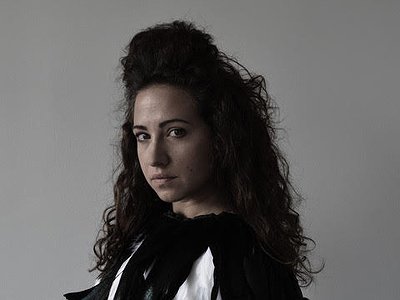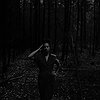Name: Anna Jordan (AKA The Allegorist)
Nationality: Hungarian / German
Occupation: music producer / artist / composer
Current release: Hybrid Dimension I. on Detroit Underground
Recommendation: I would recommend the movie La Jetée by Chris Marker and the painting Las dos Fridas by Frida Kahlo.
Website/Contact: Read more about Anna's work on her website www.theallegoristmusic.com
When did you start writing/producing music - and what or who were your early passions and influences? What is it about music and/or sound that drew you to it?
When I finally had the financial opportunity, and released my suppressed desire, I started to make music in 2015 when I was 29 years old, from zero. Coming from a disadvantaged background, I’m glad that my environment didn’t define who I could become. I had not really heard any music until I was 18 since I grew up under strict conditions. I really liked to sing in grade school and my earliest inspirations were people like Ennio Morricone, Lauryn Hill and Moby.
[Read our Moby interview]
For most artists, originality is first preceded by a phase of learning and, often, emulating others. How would you describe your own development as an artist and the transition towards your own voice? What is the relationship between copying, learning and your own creativity?
For over 10 years I made visual arts where I went through the classic phases of a learning process in an artistic way. I’m very inquisitive, constantly thinking, observing, and learning, it’s almost an addiction for information and self-improvement you could say. So, when I started to make music, I was already in my thirties and had a clear, sophisticated vision with preferred and matured aesthetics in mind.
I knew I would have to let my voice out finally and that I wanted to be able to create the full compositions on my own, which is possible with electronic music. I only had to get the tools and learn the skills of production so I could release that voice.
What were your main compositional- and production-challenges in the beginning and how have they changed over time?
My first challenges were technical but thankfully all technical information can be found on the Internet and I like to watch tutorials and read manuals.
The challenge of the composition process for me is to remain patient and to keep following the right thread. It’s not enough to create a nice groove, a beautiful melody or an interesting arrangement. I have to find the track’s meaning and core statement.
There is also a difficult relationship with the ego. Sometimes I need my ego to be huge, having the attitude “it’s not enough, I can do this much better” so I can keep working on that track for another 12 hours, like crazy. And sometimes I completely have to lose it, in order to give the track that pure message. Sometimes to let go of your own version of an idea needs more strength than to push it into a meaningless perfection. I feel very vulnerable then, but even if I see myself as the creator I’m actually also the soldier.
What was your first studio like? How and for what reasons has your set-up evolved over the years and what are currently some of the most important pieces of gear for you?
I started out with a basic setup, just a laptop, Ableton, Yamaha speakers, a midi keyboard, the guitar I couldn’t play and a cheap mic. My very first tracks with that setup were released the year after on the album Botanical Utopia.
In 2016 my interest for mixing and orchestral instruments grew, so I expanded my studio with Cubase and orchestral plugins from Native Instruments and Spitfire. A year later my second album Hybrid Dimension I was released at Detroit Underground.
In 2018 I put a lot of effort into improving my monitoring situation and the Adam A77x with Vovox cables moved into my studio. In 2019 I started to play live and finding the right hardware got more important. During my residency at Amplify Berlin I got the possibility to work with different machines directly. This is how I fell in love with the Analog Rytm MKII from Elektron which is my favourite piece of kit.
I’m also really attached to my laptop and digital setup.
How do you make use of technology? In terms of the feedback mechanism between technology and creativity, what do humans excel at, what do machines excel at?
Music production as an electronic producer depends heavily on technology. I didn’t have access to information and technology in my early life so I personally appreciate it a lot.
I really love the way technology is used in music production today. Sure, it will get more automated in the future, but I am not worried that creative processes will get taken over by machines. Lots of works and music out there made by humans are perceived as art and approved as such, but it doesn’t mean that they really are that. And that kind of work I never considered creative anyway.
Production tools, from instruments to complex software environments, contribute to the compositional process. How does this manifest itself in your work? Can you describe the co-authorship between yourself and your tools?
It’s very easy in first world countries to get lost in endless, consumption-based possibilities. I grew up with very limited access to anything and learned early on how to get the most out of very little. On the other hand, it’s very important to have a setup you can work with efficiently and rely on in the long-term.
I spend a lot of time planning carefully before I invest in something, and I don’t like the idea of collecting things in general. I’m either building a strong bond with my belongings and use them forever or let them go if they didn’t work out as planned. Everything in my studio has a purpose.
Also there is this first lesson in arts, how far do we need to go back in the production process to stay ‘original’? When I used to paint, I went further and further back, until I sawed the wooden strips for my canvas frames, cooking my own colours, primers and so on. It’s difficult to find the time for art and stay focused when you do everything from scratch, but I also learned how different and important it is to carve out your own tools or materials.
I always like to have a piece of raw, unpolished, original material in my tracks, in the arts we used to say ‘some dirt in the colours’, while I aim for absolute perfection in the whole sound.
Collaborations can take on many forms. What role do they play in your approach and what are your preferred ways of engaging with other creatives through, for example, file sharing, jamming or just talking about ideas?
Not only do I really like to spend time alone, but it is also very effective. For the art I make, I have to get down the hole and stay there. You can catch me in those periods sometimes close to my apartment looking like a zombie in pyjamas desperately looking for food.
Until now, I never collaborated with my music project and I just arrived at the point where I would like to open up the concept of The Allegorist and invite others to take part in it.



